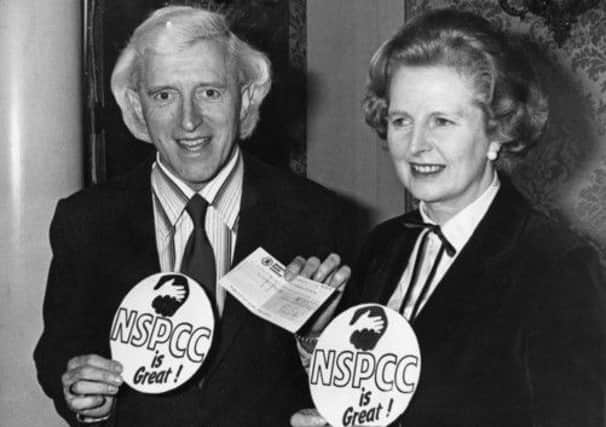Thatcher ignored fears over Jimmy Savile knighthood


Previously unseen Cabinet Office documents from Lady Thatcher’s premiership admit to advisers’ “worries” about Savile being made a “Sir” against a backdrop of “unfortunate revelations” about his private life.
The television star was knighted for his services to charity in 1990. But evidence the Jim’ll Fix It presenter sexually abused scores of victims caused the Honours Forfeiture Committee to look into the possibility that he brought the honours system into disrepute.
Advertisement
Hide AdAdvertisement
Hide AdAccording to reports, Lady Thatcher apparently tried to knight Savile several times before succeeding in her final year of office. However, correspondence from the her aides dating back decades shows there were concerns about bestowing the honour upon the DJ.
One adviser’s letter to the prime minister stated: “Mr Savile is a strange and complex man.”
It adds: “Fears have been expressed that Mr Savile might not be able to refrain from exploiting a knighthood in a way which brought the honours system into disrepute.”
As early as 1970, then Labour prime minister Harold Wilson was apparently rejecting calls for Savile to be made MBE.
In November 1986, Margaret Thatcher’s private secretary, Nigel Wicks, described the prime minister as “most disappointed” Savile was not on the New Year’s honours list.
Downing Street aides were understood to have been anxious about newspaper reports dating back to the early 1980s in which Savile boasted of his ability to pick up women while running charity marathons. With the government worried about the spread of Aids, civil service head Robert Armstrong – whose job was also to chair the honours committee – pointed out that “sexual promiscuity” like Savile’s was not to be encouraged.
Later, Robin Butler, who had once been Thatcher’s private secretary, wrote: “We have again considered the name of Mr Jimmy Savile, whom you have of course considered on previous occasions. We have again concluded that he should not be recommended.”
His letter explains: “My committee and I still fear that his manner of life – on his own confession – has been such that a high award for him would be an unhelpful signal when we are still having to grapple with an Aids problem which threatens to intensify.”
Advertisement
Hide AdAdvertisement
Hide AdSavile raised more than £30 million for good causes, including £12m to rebuild the National Spinal Injuries Centre at Stoke Mandeville Hospital in Aylesbury, Buckinghamshire.
He died in October 2011, but his crimes only came to light the following year. More than 200 offences have been recorded against the disgraced TV presenter. Of his victims, nearly three quarters were children.
Commenting on the newly released papers, the Cabinet Office said: “There is no indication in the papers that anything was known then about the allegations that have subsequently come to light about Jimmy Savile. The honours process was followed in accordance with the system at the time.”
The Cabinet Office has previously rejected calls for Savile to be publicly stripped of his knighthood, as individuals cease to hold the honour after they die.